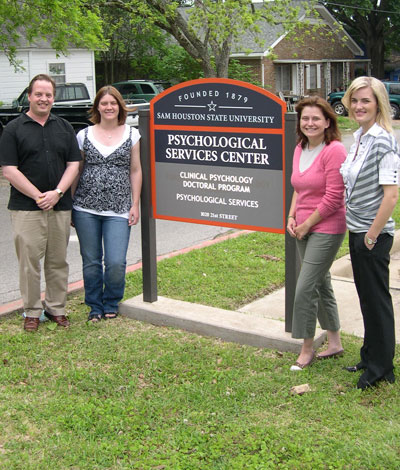Doctoral Students Reach Out In Community
 |
| (from left) Craig Henderson, assistant
professor of psychology, and doctoral students Jennifer
Rockett, Cynthia Mundt and Meghan Davis get referrals
from schools and probation officers to help students with
drug and behavioral problems. |
While trends of drug use have decreased since its peak in
the late 1990s, drug use amongst adolescents is still a big
problem today in communities of all sizes, according to Craig
Henderson, assistant professor of psychology.
“It’s not a socioeconomic issue; it’s not
a race or ethnicity issue. Any community is going to have
problems with it,” he said. “There are segments
of the population for whom it’s a real big problem,
such as kids with legal problems; drug use and legal problems
go hand in hand.”
As a psychologist, Henderson has had a vested interest in
family and adolescent therapy and drug abuse issues since
he was a graduate student.
Through his work, he realized that the most effective way
to help both adolescents and adults with their drug abuse
problems is by taking a more hands-on approach.
“I do think when you work with clients about these kinds
of problems, it does help people to get more engaged in the
treatment you’re providing,” he said. “The
stronger collaboration, the more you’re on the same
page, the more the clients are going to benefit too.”
Because of this, Henderson encourages the doctoral psychology
students whom he supervises in their clinical training to
be more service-oriented, focusing on what happens in the
external community—the schools and the courts—rather
than focusing exclusively on individually-focused issues or
client thought processes.
“Just because of my theoretical orientation and experiences
that I’ve had, I really believe that it’s important,
in order to make changes in the lives of people, to be able
to have some influence and be involved in important factors
that shape people’s behaviors,” he said.
This philosophy is the American Democracy Project’s
Service Spotlight for April.
When Henderson came to SHSU in the fall of 2005, he found
that his experiences in the areas of young people with drug
problems and delinquency from a family-based perspective was
not something SHSU’s program had an emphasis in.
“I was nervous about how students would take to this
work,” he said. “It’s something I believe
in. I’ve seen the data and research that really supports
the treatment, but I was a little bit nervous because it does
require more work from people.
“You have to talk with more people, you have to take
time out to meet outside of the clinic,” he said. “I’ve
been really pleasantly surprised because people have been
very receptive to it and have had a lot of neat opportunities.”
Henderson supervises anywhere from two to six doctoral students
per semester who counsel a variety of “pretty seriously
mentally ill” adults and youths at SHSU’s Psychological
Services Center and not just those who have drug-related problems.
However, they get four to five referrals from both probation
officers and school teachers or principals per semester which
commonly requires them to “attend school meetings, talk
with school personnel, and if a kid’s having trouble
at school, trying to work with the teachers, the principal,
to make things better in that situation, to look into if another
placement might be better for the kid,” Henderson said.
Student clinicians will also go into the school to observe
a child’s behavior, as not to get information second-hand.
During Henderson’s time at SHSU, students have worked
with kids with behavioral problems, as well as drug problems,
at Huntsville, Trinity and Conroe schools.
“Part of the assessment is finding out what other areas
of a kid’s life he or she is having trouble with,”
he said. “I really feel like it’s our job to,
at the very least, get information in those areas and to the
extent we can, try to influence them to bring about some positive
kind of changes.”
Because youths can be extremely critical in the beginning
of the process, oftentimes being counseled against their wills,
building a relationship and convincing the kids that getting
help is something they should do for themselves and not just
their parents or schools is something the doctoral students
must learn to do, Henderson said.
“It (working with people) directly helps the problem
behavior that we’re focusing on, and it helps the client,
particularly if we’re talking about kids,” he
said. “If you can do something for them, solve a problem,
go to bat for them, they’ll get more engaged, they trust
you more; they see this as something that may be able to help
them.
“Ultimately it benefits them in decreasing the problems
that they came in for, or were made to come in for,”
he said.
In addition, Henderson’s students sometimes work with
the forensic aspects of psychology when clients’ legal
troubles are involved, doing such things as assessing juveniles
for competency before proceeding in court cases.
Among the benefits the clinical students reap from the hands-on
approach are improvement in basic counseling skills: interviewing,
learning to listen to people and how to hear emotions expressed
by someone beyond just their words, Henderson said.
Doctoral students see clients year round. Fees are assessed
based on a sliding scale of their clients’ incomes.
For more information on the Psychological
Services Center, call 936.294.1210.
—END—
SHSU Media Contact: Jennifer
Gauntt
April 13, 2007
Please send comments, corrections, news tips to Today@Sam.edu.
|


